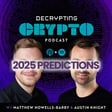Become a Creator today!Start creating today - Share your story with the world!
Start for free
00:00:00
00:00:01

S01E01: What is Bitcoin?
Using Bitcoin as the primary example, we focus on helping you, the listener, better understand the fundamental concepts behind cryptocurrencies. This will include blockchain technology, what a cryptocurrency actually is, and some definitions of jargon related to it (mining, nodes, blocks, etc.).
This is the first episode of series 1 of the Decrypting Crypto podcast, designed to ease you into the initial concepts behind blockchain technology.
Full show notes: https://thecoinoffering.com/podcast/s01/e01-what-is-bitcoin/
Transcript
00:00:05
Speaker
Why, that's ridiculous. After all, I'm the one who sends salutes if anything happens. I think I should have the right to endure myself. Get my own choices.
Podcast Introduction
00:00:16
Speaker
Hello, bonjour, ciao. Welcome to the first episode of Series 1 of the Decrypting Crypto Podcast, where we take the complex and confusing world of cryptocurrencies and blockchain technology and distill it down into regular human language. I'm Matthew Housebarbie, and I'm here with my co-host, Austin Knight. Both of us have been in the tech industry for a number of years, but Austin, why don't you start by telling everyone how you got into crypto?
Personal Crypto Journey
00:00:44
Speaker
Yeah. So I recently moved to Brazil. I've been living there, soaking up the culture and the sun as much as I, as much as I reasonably can.
00:00:56
Speaker
And I've been intrigued by the economic situation there. Recently went through a crisis, lots of inflation issues with the currency. And right around the same time cryptocurrency was becoming a massive force. And so I've seen a lot of potential for crypto to change the power dynamic when it comes to currency. So I got interested in it, invested a little bit,
00:01:25
Speaker
played around with some of it. And here we are today, learning about it still. So you're not driving your Lambo yet? Not quite. OK, so I've been playing around in the crypto space for maybe a couple of years now, investing wise. Prior to that, played a little bit around with Bitcoin mining, not really knowing what the hell I was doing at the time. And in all honesty, been super interested in the space and have been getting more and more involved.
00:01:53
Speaker
And that's what brings us on to the podcast, right?
Target Audience
00:01:58
Speaker
So both Austin and I collectively, we run the coin offering and educational site around all things crypto, but Austin, maybe you could give everyone out there listening a little bit of an intro into maybe who this podcast is actually for.
00:02:12
Speaker
Yeah, I think that there's two main types of people that would benefit the most from this podcast. The first, if you're just now learning about cryptocurrency, maybe you've seen some of the news about Bitcoin rising and falling values.
00:02:29
Speaker
And maybe you're a little overwhelmed by it. You're thinking, you know, this sounds interesting. I might want to buy some of this stuff, but I don't even really know where to begin, nor do I fully understand this yet. And of course, you don't want to put your money into something until you actually understand it. We're going to distill that information down into terms.
00:02:50
Speaker
that you can wrap your mind around. Or you may be somebody like me a couple months ago, who has been in the tech industry, understands a lot of the dominant emerging technologies that are coming up right now. But still, there's a lot of intricacies to the blockchain and to cryptocurrency that you're not completely sure about. And you want to make sure that you're fully brushed up on how all of this stuff works. You're going to benefit from this as well.
00:03:20
Speaker
For sure. So, just to give you a little taster for what's coming up in series one of Decrypting Crypto, we're gonna be covering all kinds of stuff.
What is Bitcoin?
00:03:29
Speaker
So things like, we're gonna show you how you go about actually buying your first cryptocurrency, what actually gives them value, what the hell mining is. You're probably hearing a bunch of different terms, ICOs, what are they, things like Ethereum, understanding Bitcoin. And that kind of brings us on to,
00:03:47
Speaker
the topic of this episode, episode one of series one, which is all folks around understanding what Bitcoin actually is.
00:04:00
Speaker
That's a big question, Matt. It is pretty big question, right? And I think that's where there's a whole lot of questions and in particular brings us into most people's entry point into cryptocurrency as a whole. And maybe you could do a quick definition in the most layman language for everyone out there of what what kind of a cryptocurrency actually is.
00:04:26
Speaker
Yeah, so while Bitcoin might not be the perfect entry point, it is the most popular, so that's where we're at. Defining a cryptocurrency can get really complex. If you look up an actual definition of what a cryptocurrency is, it'd be something like a cryptocurrency is a decentralized digital currency that can be used like any other form of currency to buy, sell, and trade. That makes complete sense. I understand it all. There's so much more that goes into that, though.
00:04:53
Speaker
Oh, for sure. And I think here's the starting point is understanding, first of all, that cryptocurrency is first and foremost a currency.
Fiat vs. Crypto
00:05:03
Speaker
And we'll come into like what that actually means in a later episode. But basically hedging this against what is a fiat currency and what is a cryptocurrency?
00:05:16
Speaker
Anyone that started their initial bit of research, maybe you've done it yourself and you're thinking, okay, what the hell is a cryptocurrency? And people are saying, well, it's very different from this fiat currencies. Fiat currencies, very different to cryptocurrencies, are backed by, more importantly, a controlled entity, but usually a government. And examples of this would be like the US dollar, the euro, the pound sterling, right?
00:05:41
Speaker
on the other hand cryptocurrencies are very different this is where people start to get a little bit confused but please bear with us going up cryptocurrencies are not controlled by a government more so they're not even controlled by any single centralized institution body individual company anything like that they are run completely autonomously on a technology called the blockchain the blockchain
00:06:12
Speaker
But kind of before we go into that, maybe we just break down the difference between like blockchain and Bitcoin. Because these are two very different things. There are lots of different cryptocurrencies. There are lots of different blockchains. But they're not the same thing, right? Absolutely. So why don't we start by just taking the example of a payment? How does that work?
00:06:32
Speaker
Actually, that's a much better idea, I think. Okay, so let's think about this in terms of how you would go about making a payment in your current centralized banking system. So most of us here that are listening probably have a bank. And let's say I want to send some of my US dollar over to Austin.
00:06:53
Speaker
What I'll do is I will ask Austin for his account number, written number, and I'll maybe go online or I'll go directly into the bank or over the phone and I'll make a request to the bank to send some money. Now, what a lot of people that haven't dug into this would just think is like, okay, well then that request goes in, the money goes straight to Austin, he receives it, that's it.
00:07:16
Speaker
Well, it's kind of not really the case. The bank then sends this transaction through their systems, and let's say I was sending money to Austin in Brazil in particular. That money may bounce over to a ton of different other countries on the way, especially if that bank doesn't have a direct link to another bank in Brazil. So we may find, okay, that money is bouncing over to Switzerland, Sweden, and all of these other institutions is taking a bunch of extra time
00:07:45
Speaker
More importantly, it's taken a bunch of extra cost because for every time this has bounced around all these banking systems, really all technologies in those banks as well is racking up different fees from all these third parties along the way. Eventually after like what, three or four days at best, Austin receives his money from me and we've had a bunch of charges on the way.
00:08:11
Speaker
That is very different from how the blockchain works. Let's just take Bitcoin. So with the blockchain, what's different is similar to how we have account numbers and routing numbers with a bank, you have a public address. Think of that like your bank account number for Bitcoin. And you have a wallet, which is kind of like your bank account in the current banking system. In your wallet, you'll store your Bitcoins. This is a digital wallet. It's not a physical thing.
00:08:41
Speaker
And I'd say to Austin, okay, Austin, I need your Bitcoin public address. Austin gives me that. It's like a long alphanumeric bit of text. And then I go through and I add in his public address into my Bitcoin wallet.
00:08:57
Speaker
I send the amount of Bitcoin that I want to send into the blockchain, which is almost like our version of the bank processing this transaction. That goes straight through into the blockchain. There is a single fee attached and the transaction is processed on the blockchain, sent directly to Austin within maybe on average, what, 20 minutes. There's been no third parties that have taken place and it's completely peer-to-peer.
00:09:25
Speaker
We drop all of the enormous fees. I mean, we're going to probably come on to some of Bitcoin's fees in particular, right? But what we're not seeing here is all of these different third parties involved in you just making a simple transaction, actually getting a cut of all these fees.
00:09:42
Speaker
And this is like the main differentiation between the blockchain and like cryptocurrencies versus making a payment in the current financial system. I think to summarize that, it's like speed and cost are the big benefits here.
00:09:57
Speaker
And also thinking about the fact that blockchain and cryptocurrencies are not limited and controlled by national lines, whereas USD, the euro, those belong to certain regions of the world. This is a little bit more global.
00:10:15
Speaker
So it changes the dynamic there. Right. You can't just have a government come in and say, well, you know what, like we need to print some more cash, like what often happens around like economic crises. Let's take like 2008, right? Financial crisis. The US printed like unprecedented numbers of US dollars. What that does is when you print more dollars and push more into circulation, it weakens the value of every other dollar.
00:10:38
Speaker
That can't be done on the blockchain because there's no one person or entity that just says, hey, we're going to change Bitcoin. It has to happen in like a very democratic way through a consensus between every single person that's involved in this giant decentralized network.
Blockchain Security
00:10:56
Speaker
I don't want to get too deep into that for the first episode because I know it can be pretty overwhelming, but I think another really interesting point to touch upon
00:11:03
Speaker
is the security aspect of Bitcoin and cryptocurrencies. How is it secured though?
00:11:11
Speaker
We know that it can be inherently insecure when you have centralized networks of currency or entities that are running a currency like you do with fiat currency. And we've been talking a bunch about how cryptocurrencies are decentralized. And one of the largest benefits of this is that it makes it more secure. But how does all of that work?
00:11:34
Speaker
Well, yeah, I mean, you look at just like the news stories, like if you type in hack or like major hack into Google, you'll probably see a flurry of news articles that talk about different companies that have been hacked and personal details lost. I mean, what was it? Yahoo? Was that like 2017 or 2016 where they lost something like, was it billions of emails, email addresses that got leaked? Huge amounts of data. Huge amounts of data.
00:11:58
Speaker
And more importantly, banks. Banks get hacked and have security breaches on like a monthly basis. The extent to which data is lost is like another thing, but one of the main reasons why all of these massive data breaches happen is because these companies, these institutions, they store and have access to all of your information and have that all within their own systems. You get into, let's say, in a very basic terms, you get into Goldman Sachs,
00:12:26
Speaker
data warehouse, you have access to everything. On the blockchain, because all of this information is spread out across a ton of different, let's say computers for all intents and purposes right now, we're going to go a bit deeper into explaining this in some of the future episodes, but because information is decentralized and not just all stored in one location,
00:12:50
Speaker
You can't just get into the blockchain and get access to all information. You'd need to hack every single computer that's hooked up to the blockchain, which is millions at this stage. And that's only going to get bigger, which means you don't have these like honeypots of information or backdoor entries into these like data warehouses where all information can be lost.
00:13:10
Speaker
So if you want to rob a home to use an analogy, you no longer have to break into a single house. You've got to break into the whole neighborhood at the same time. That is a much better way to put it, Austin. Yeah. And I think that's the best way to think about it, right? Like the whole like hype around cryptocurrencies, there's so much going on in the space and so much news articles, but there's also this huge, almost cult like following. And what that stems from is the fact that
00:13:38
Speaker
everyone that is a part of this community also has the opportunity to help be a part of and benefit the whole of the blockchain community and the cryptocurrency networks by literally being a part of like this giant neighborhood of people, right? And instead of just having one person like, all right, Facebook, right?
00:13:58
Speaker
cool, great company, interesting, but ultimately Mark Zuckerberg can just make a decision and go against everyone. And regardless of whether you have people who have very good intentions, the fact that they have power to make decisions over other people is not a good dynamic to create.
00:14:17
Speaker
And that's one of the big pieces that cryptocurrencies solve. But I don't want us to get too stuck in a rabbit hole here of going into all of the ethics and the morals around blockchain because what we just want to kind of do within this episode in particular is bring you as a listener up to speed with what this thing Bitcoin is.
00:14:39
Speaker
And you're not going to come away from the end of the episode and be an expert in Bitcoin, right? I don't think anyone is actually an expert in Bitcoin right now because it's changing so much. But everybody that's an expert in Bitcoin right now was an expert in VR six months ago. Yes, I think we're going to see more and more experts pop up. I see Bitcoin trading experts pop up everywhere. Some just mind-blowingly amazing Facebook groups to just lurk within to see the things people are talking about.
00:15:08
Speaker
We do not profess to be experts, but we're certainly very close to information and have at least used this technology regularly. And in all honesty, I think we're trying to make sense of a lot of this stuff ourselves. And that's going to be a big part of the journey that you as a listener are going to be able to come aboard. So let's change speed a bit.
00:15:27
Speaker
One of the questions I often get, and me and you, Austin, we were talking before this episode about how you were speaking to your family and getting more and more questions about what the hell Bitcoin is, what the thing cryptocurrency is. And a lot of things people often say is, well, like, how is this thing different from something like the US dollar? And maybe we go into something where it's been more of a straight up.
00:15:47
Speaker
comparison here. If we just break this down on a fundamental level, there are a few key things that separate. Let's just use the US dollar for this example. US dollar versus Bitcoin. So Bitcoin has a hard number in circulation. There's a maximum number of Bitcoin that can ever go into circulation. And once we hit that number, it's about 21 million. That's it. There's never going to be more of them.
00:16:14
Speaker
On the contrary, there is no limits on the amount of USD that can go into circulation. So you need more money, you can print it. It's completely fine. This changes a lot of the value dynamics that are applied to these currencies. Bitcoin has a very hard market cap that is partially determined by the maximum number of Bitcoins that can go into circulation.
00:16:37
Speaker
Yeah, more importantly, it's very predictable, right? Like, we actually know new Bitcoin are released into circulation in a completely predictable manner. Like every 10 minutes, pretty much, some new Bitcoins are released into the economy.
00:16:54
Speaker
By around about, I think it's like sometime in May of the year 2140 is when every single one of those bitcoins will be in circulation. That gives a huge amount of stability to know how much is in circulation, a complete constant to that will not be changed. This is written into the code of Bitcoin. Remember,
00:17:14
Speaker
All of this is software level. This stuff cannot be changed. Whereas like your main point there is the US dollar is kind of like, well, this may change from one day to the next and is very unpredictable. I think the other big thing there, and we've touched on this a little bit, but
00:17:31
Speaker
The US dollar is controlled and backed by the state. It's completely the government's call on how they treat, determine the rules and how much is in circulation. But Bitcoin on the other hand is not backed by any nation, any company. Bitcoin is not a company. It's a technology. It's software in its sense. And this has been set up and runs completely on its own. It can sound a little bit,
00:18:00
Speaker
scary, but this doesn't mean that Bitcoin can't be used as legal tender. You don't need to be backed by a state to actually use Bitcoin. It doesn't need to be backed by anything. If anything, I think this prevents Bitcoin from being overly regulated or manipulated to a certain extent, more directly at least in the long term versus the US dollar.
00:18:26
Speaker
Yeah. And that's one of the big things for me. As you start to learn about Bitcoin, it can sound a little scary and intimidating. In fact, people may say, well, you know, it's not backed by anything, which is a scary thing that we're going to cover in later episodes. But as you
00:18:41
Speaker
Learn more about it and you dive into the implications of this technology you realize it's actually a very good thing that it's not controlled by a centralized entity and that it's not backed by a government this means that for example a corrupt politician cannot be elected into office like if you want to take Venezuela for example.
00:18:58
Speaker
and completely change the national policy, destroy the economy, and render people's currency utterly useless to the point where they can't even buy basic needs items like toilet paper and Tylenol, much less leave the country and seek a better life. So because this is decentralized and it's not fully dependent on one single entity, it becomes a much more trustworthy and powerful solution.
00:19:24
Speaker
Yeah, and I think the thing that we haven't probably touched upon here, especially around the layer of trust, right, is let's just think about this. The US dollar transactions are being made every day. People are using US dollars every day in huge, huge volumes. But if I said to you, Austin, like, how many people are using the US dollar right now? What is the actual volume of transactions? You would have to maybe, if you can even get that information,
00:19:50
Speaker
Trust the government to release that information and the fact that it's true. One really powerful, probably the most powerful in all honesty, parts of Bitcoin and blockchain in general is every single transaction ever made with Bitcoin.
00:20:08
Speaker
Able to be seen in what's known as the public ledger Think about this as an accounting ledger that you would have you can go in anyone right now You could do this you can go and see transactions in real time that are being made by Bitcoin. These are like irrefutable Transactions, you can immediately go in and see every bit that's being used at any time this means that like
00:20:33
Speaker
When transactions are made and someone is saying that someone has paid someone, they are there for everyone to see. There's no more, oh, this transaction that I made to you via my bank, Austin, this money got lost during the wait. That happened. All the time. All the time. The entire Nigerian Prince scam is based on that.
00:20:53
Speaker
We just solved that whole issue. Yeah, it's done Like how do like this always baffles me like where where did the banks lose the money and what happens to it? Right like with Bitcoin that can't happen This is an incredibly powerful piece and I think more than anything if we just take a step back
00:21:12
Speaker
from a bigger picture political and philosophical point of view building in transparency into finances and the way that the entire economy is being ran is such an important piece because right now transparency comes and the emphasis of that transparency comes from a government being trusted and saying hey I'm gonna be transparent with you what they're saying is take my word for it right and no matter how good their intentions are
00:21:36
Speaker
they can't really prove them any other way. So yeah, that's like a big piece. But there's a lot of people that don't want Bitcoin to succeed and cryptocurrencies to succeed for obvious reasons. I think one of the biggest institutions attacking publicly cryptocurrencies has been the banks, because this really could upend the entire financial services sector.
Bitcoin Misconceptions
00:22:00
Speaker
And one phrase that is probably one of my favorite phrases that I see all the time, and this is a common question as well, is like people will be like, oh, you know, like, isn't Bitcoin just used by criminals? Is this not just like basically the way to buy drugs because Bitcoin is anonymous? How do you go about actually answering that question, Austin?
00:22:20
Speaker
I think that as you dive into it deeper, you realize that Bitcoin is much more difficult for criminals to use than fiat currency. It's just that the nature of some of its history and its ties to things like Silk Road, those things get covered more in the media, especially by entities that feel threatened by this technology.
00:22:42
Speaker
Silk Road in particular is a pretty interesting one. For any of you listening that didn't hear about this, I would recommend Googling around the history of Silk Road. But basically, if any of you have heard of the Deep Web or the Dark Web, whatever you want to call it, there was a website called Silk Road, which I think was around 2012, 2011 that was launched that was basically a huge marketplace for buying all kinds of awful things.
00:23:09
Speaker
hiring hitmen, buying drugs, like whatever you want. I think there was like human trafficking going on there. And one of the main ways that they took payments was through Bitcoin. Now, there still has to be a facilitation to get US dollar into Bitcoin. So to say that Silk Road was basically only being made possible with Bitcoin is a bit of a stretch. I think certainly it definitely helped.
00:23:35
Speaker
But I think a lot of people then attribute Silk Road to almost being a core part of Bitcoin. But it's incredibly important to understand that those two entities are very, very, very different things. And we were talking earlier as well around like hacking, right? People will say, well, wasn't Bitcoin hacked recently? No, Bitcoin has never been hacked. And it would be incredibly difficult to be hacked. But exchanges have been hacked.
00:24:03
Speaker
Yes, that's correct. So when you talk about the security of Bitcoin, a lot of that security rests on the fact that it's decentralized and that as for our simple explanation that we used earlier, it's being run and controlled by thousands, hundreds of thousands, millions of computers all around the world and not a single data warehouse.
00:24:27
Speaker
like you would in the case of a bank. So you would have to hack all of those computers rather than that single data warehouse. However, when you do take that currency and you centralize it in an exchange,
00:24:39
Speaker
like something like Coinbase, for example. Just think about this like a currency exchange, like as you would go, and if you're going on holiday, right, you're gonna go and transfer in some of your US dollar, you wanna ship that into euros, for example. Similarly, there needs to be a way of changing your US dollar into cryptocurrency like Bitcoin. So there's a lot of websites, Coinbase being one of the largest ones, Kraken and a few others are another big player, but that's where you'll go and actually make these exchanges online.
00:25:08
Speaker
Right. And in order to make those exchanges, the currency does have to be centralized to a degree. If you leave your currency in that exchange, in that centralized place, and you don't take it out, that exchange can get hacked and your currency can be at risk. That's why the number one rule of buying and trading cryptocurrency is that as soon as the transaction is complete,
00:25:31
Speaker
take it out of the exchange. So this can be misconstrued, especially in mainstream media and by analysts that don't fully get how this stuff is working to be that the blockchain has been hacked because some cryptocurrency has been stolen.
Centralized Exchange Risks
00:25:44
Speaker
But it wasn't the blockchain that was hacked. It was the centralized exchange, which is a completely different entity that was just holding on to the currency for a period of time.
00:25:52
Speaker
That's what's been hacked. And that's how the currency was taken. Yeah. And I think that it's important to bear in mind, these are companies that are centralized companies, companies like any other company that you would find. And that's one of the challenges in next episode, we actually are going to be talking all about buying cryptocurrencies. And we'll touch on some of these pieces in more detail. But
00:26:17
Speaker
One of the things I want to pull out of some of the things that you said there was a bit around when we were talking of how Bitcoin is anonymous. And there are elements to this that aren't necessarily true. And a lot of people kind of find that quite scary, maybe listening, thinking, wait, so I can own currency and nobody knows that. It's completely anonymous. Surely I could do anything with that money.
00:26:42
Speaker
Yes and no. Right. So the reason, first of all, why people say Bitcoin is anonymous is because when you have a bank in the current system with US dollar, you have all of your details stored within that bank account. You're completely identifiable by your name. You'll have to give over like
00:26:59
Speaker
your passport, publicly identifiable records, and everything will be stored by the bank on your behalf. The other thing to remember there is the bank owns your money. You don't own your money. They choose to give you access to that money. Then with Bitcoin and other cryptocurrencies,
00:27:16
Speaker
All you basically have is what we call your public key or public address, which is kind of like your sort code account number and your Bitcoin wallet, which gives you access to your Bitcoins. That doesn't have any of your public data stored in it.
00:27:31
Speaker
You don't need to give over even your name anything to open up a wallet. That said, if you want to buy Bitcoin, you need to first of all transfer in some of your US dollar, your pound sterling, your euro, whatever. And to do that, you have to at this moment in time go through an exchange.
00:27:49
Speaker
And when you sign up for an exchange like what we talked about with Coinbase, you have to give over your personal information because they have to abide by KYC and know your customer rules, which basically say you need to be able to identify all of these people so that it can curb things like tax evasion, things like that. So that creates kind of a footprint. We're going to go into this in way more detail at a later point, but I just wanted to reel that piece off.
00:28:13
Speaker
It's also important to note that the legislation is still really developing in this space right now. The United States is cracking down on this. We've just gotten a bunch of information on how taxes will work and KYC laws. And ultimately, at the end of the day, it is a public ledger. Even though it's anonymous, there is a high amount of transparency to this. It's much more transparent than any fiat currency ever has been. So
Crypto Adoption & Regulation
00:28:42
Speaker
I think that this association that cryptocurrency has earned itself indirectly to criminal activity is largely due to the fact that it was a fledgling technology that was not in the mainstream and was therefore a little bit more easily exploitable. This turned into a big media story, but when this
00:29:03
Speaker
becomes full circle when cryptocurrency really reaches the point that it's ultimately heading to as being a dominant monetary form, it will be way, way, way more difficult to do criminal activity with this form of a currency.
00:29:19
Speaker
Yeah, we're going to need to find something else for us to do our criminalizing. Yeah, I know. We're going to have to print like paper bitcoins or something. Paper currency is much better for situations like that. You know, I've actually seen people handing out physical bitcoins in Brazil. That really freaked me out.
00:29:39
Speaker
There was actually an interesting news story I read, and this was actually a few days ago. So around, I think, 2014, there was some guy, and I forget his name, and he was basically creating physical gold coins with the Bitcoin logo on them. And he was like, I can't remember how he did it, but basically within the coin was printed the public and private key to get access to that one Bitcoin.
00:30:07
Speaker
so these were like a limited release and he actually got like shut down by the government because he was i can't remember the exact rules but he was like making his printing currency yeah yeah but one of these bitcoins they went up on ebay the other day and i think it sold one bitcoin sold for like two
00:30:25
Speaker
$28,000 when the current valuation at the time was like $14,000 because there's almost like an element of like collectors item to this piece. But yeah, I think as we, as we see this space evolve, there's going to be all kinds of other stuff that comes in and amongst all this. There will be, but just to be completely clear, that's like a really silly thing that guy did.
00:30:46
Speaker
There's not going to be actual physical Bitcoins floating around, at least as far as we can tell, that's a little bit of the antithesis of what this is supposed to be. And that is part of its strength, is that it's not fully physical.
00:31:01
Speaker
For sure. I mean, the thing just to round this all up
Episode Recap
00:31:04
Speaker
is right. We are at such an early stage of Bitcoin. US dollar has been in circulation for like a couple of hundred years, right? So Bitcoin has been around since 2009 and that is the oldest cryptocurrency of any cryptocurrency.
00:31:16
Speaker
At the time of recording this, I think there's around about 2,000 different cryptocurrencies, not all of them using the application of just being a payment solution. We're going to come into that in a bit more detail later on in the series, but there's a lot of development that's going to happen in this space. But just to round things up here before we jump off is
00:31:37
Speaker
The key differentiation that we want to and the thing we really want to drive home is the difference between fiat currencies like the US dollar and cryptocurrencies. One, the fiat currency being completely centralized and owned and backed by the state. Whereas the cryptocurrency themselves running on a technology called blockchain is completely decentralized. And the thing that you're probably kind of thinking about right now is, all right, cool. I kind of understand some of these basics.
00:32:06
Speaker
how to actually go and own these coins. And that is what we're gonna be going through in the second episode. So make sure you join us for that one. Thanks for listening. If you love this episode and wanna show your appreciation to myself and Matt, give us a review on iTunes or your favorite podcasting platform. We really appreciate that. You can also visit thecoinoffering.com to learn more about cryptocurrencies, get caught up on some news,
00:32:36
Speaker
see how your currency is performing. And you can follow us on Twitter at The Coin Offering, as well as email us at podcast at thecoinoffering.com if you'd like to get in touch. Here's a sneak peek at our next episode. You are going to go through every kind of possible emotion that you can ever face in your life. By the end of this episode, we're going to get you to the point where you are going to be able to have bitcoins inside your wallet.
00:33:10
Speaker
The contents of the Decrypting Crypto podcast should not be used and are not intended as investment advice. Please do your own due diligence before making any investment, cryptocurrency or otherwise.




![CBDCs: The [Dark] Future of Money (Part 2 of 2) image](https://media.zencastr.com/cdn-cgi/image/width=112,quality=85/image-files/61fc0461fb20e00040aeb09e/5b9f1396-2a8e-418d-82a0-30fd00969266.jpg)






